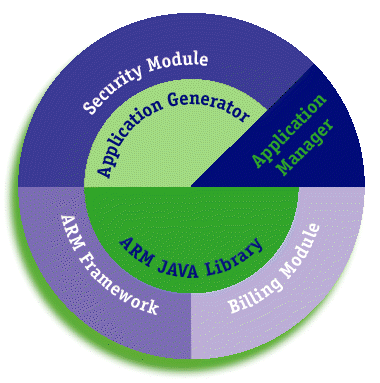|
The Service Provider (xSP) market is poised for a rapid growth over the next few years. This will be combined with the evolution of many IT departments, within large organizations, into xSP's who
charge user departments for services. As a result, there is an increasing need for flexible and powerful tools that can meet the requirements of service providers. The IntuitiveJ Service Provider Tools from NetCentric is a suite of products, designed to adequately meet the needs of this growing market segment.
The components of the IntuitiveJ suite are available either as products, or as Java class libraries for integration within existing applications.
IntuitiveJ-Generator:
This product permits the design of J2EE applications, Java applets, applications and self-updating applications that access data in JDBC databases. The graphical development environment allows users to easily describe the functionality and generate the Java source code. Using this powerful tool, users with a basic understanding of  application design concepts can, within hours, design application design concepts can, within hours, design
powerful applications to access corporate data. The applications can be generated, compiled and run without writing Java™ code. Java developers can use the tool to reduce the development time to a fraction of that required using conventional Java tools.
IntuitiveJ-Generator is a purely graphical development environment. Database views are created then the GUI is created by adding scrollable text fields, scrollable tables, buttons, navigation tool bars, etc. Fields can then be linked to columns and buttons to actions. Validation rules are established by the selection of options and navigation by selecting from combo boxes. Commented source code is generated, then compiled error-free, every time.
In cases where business rules are too complex to be expressed graphically, the developer can use the EVENTS feature. The GUI item is highlighted and EVENTS displays the underlying code. This can then
be edited by the developer. Team development permits work with your preferred source integrity software.
IntuitiveJ-Generator Enterprise edition can instrument the code generated for The Open Group's application response measurement (ARM 3). The code generated will then report performance metrics via HP OpenView™, IBM/Tivoli® Application Performance Manager or IntuitiveJ-ARM Framework described below.
The IntuitiveJ Professional Edition incorporates the basic Java application generator. The Enterprise Edition adds all J2EE features, the option to instrument the generated code for ARM (application response measurement V3.0) and to add data encryption and role-based security (i.e. Authorization and Authentication).
The IntuitiveJ –Generator can generate a Self Updating Application that resides on the server and automatically updates the client. When a client logs-on using an old version, an updating process begins transferring the new Java classes required.
|